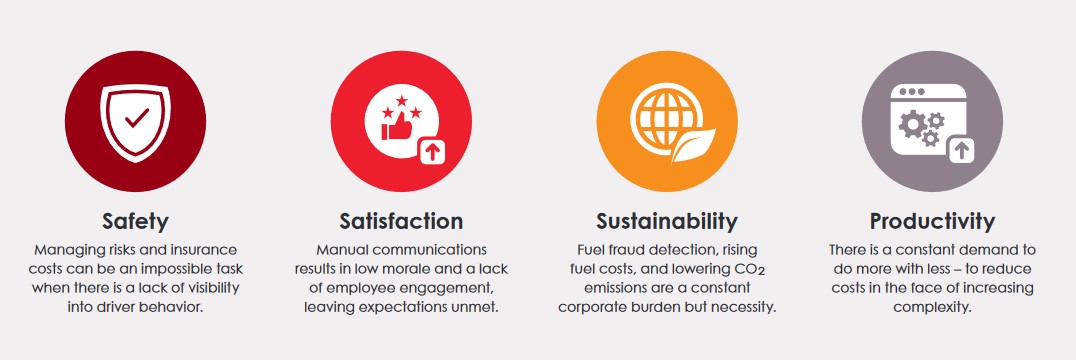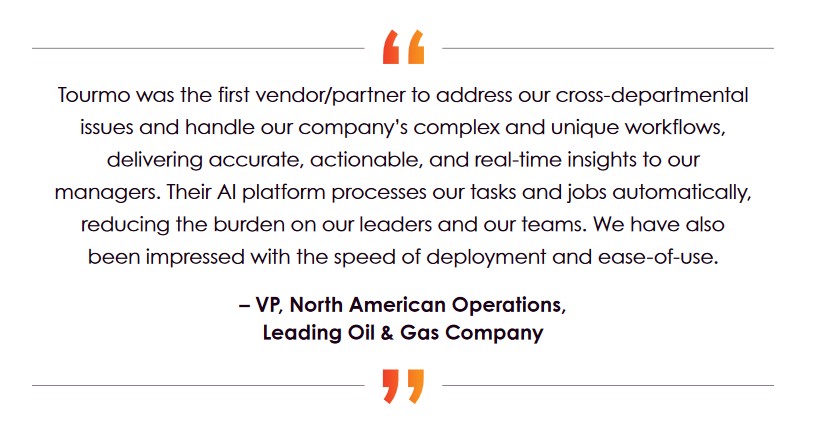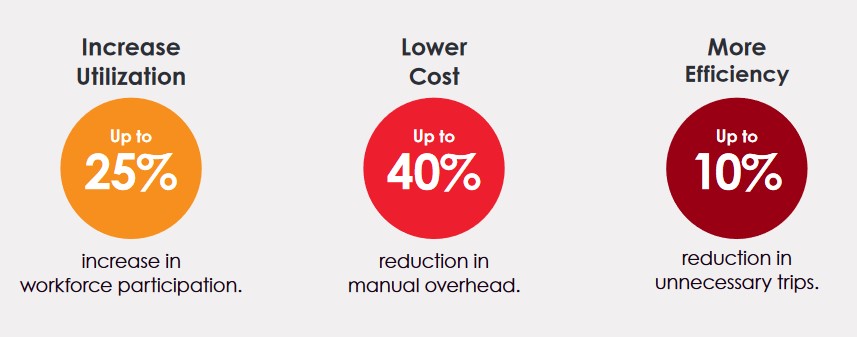The waste management industry, like many others, is undergoing a significant transformation thanks to smart technology. AI and machine learning are becoming more prevalent in various waste collection processes; one notable change is in logistics, where digital advancements have greatly improved the organization, scheduling, and dispatching of personnel and vehicles.
Current Challenges in The Waste Management Industry
According to recent statistics, the global waste management market is worth USD 989.20 billion, and it is expected to grow at a compound annual growth rate (CAGR) of 6.2% from 2022 to 2030. This sector is expected to be driven and influenced by strict government regulations, such as the Resource Conservation and Recovery Act and Waste Shipment Regulation, to improve waste management services.
Enterprise organizations with waste management mobile operations face major challenges despite significant investments in systems, technology, and management processes. While specifics vary from organization to organization, there are four common areas of concern: Safety, Satisfaction, Sustainability, and Productivity.

Safety
The waste management industry has been repeatedly challenged to go beyond simply discussing safety to actively working to improve safety performance. Employee and public safety is a top priority, which is a significant shift from 20 years ago when it was merely an afterthought. Changing the culture to prioritize safety has required major and ongoing change management efforts. Given these new safety standards, managers who fail to prioritize safety or have a poor safety record should not expect job security and their organizations will have reduced earnings due to avoidable costs.
When an organization’s workforce isn't operating safely, they will commonly experience:
- Higher insurance costs
- Inability to identify and improve undesired driver behaviors
- Inability to calculate overall risk due to disparate systems and siloed data sources
- Too much data and not enough clear, impactful information
- Difficulty reviewing, training, and coaching every violation
- Lack of visibility into the behavior of third-party workers
Tourmo's AI-powered mobility workflow automation can help an organization overcome safety challenges by maximizing the safety of their mobile workforces by unifying, correlating, and contextualizing data from their existing technology investments, and then using the insights gained to optimize and automate an organization's entire safety process structure.
Satisfaction
Another challenge in the waste management industry centers on employee satisfaction and participation. The main concern is retaining drivers, as driver turnover is widespread. Drivers and route managers frequently work more than 50 hours per week and up to 10-12 hours per day. Despite extensive discussions about increasing employee satisfaction, only a few long-term improvement initiatives have proven to be successful.
The internet is awash with information about the growing shortage of long-haul and local fleet drivers, which is a problem that has persisted for the past 15 years. This shortage poses significant challenges to mobile operations that are challenging to overcome. As a result, many organizations will need to adopt advanced tools and methods to effectively manage, train, engage, and support truck drivers.
When an organization reports low satisfaction levels, they will commonly experience:
- Disengaged employees that aren’t clear on their job expectations or effectively produce
- Communication breakdowns, inaccurate and inconsistent information
- Inconsistent enforcement of company policies and guidelines
Tourmo's AI-powered mobility workflow automation can help an organization boost satisfaction levels by automating their communications and processes from the back office out into the field, and to customers in real-time, helping to dramatically improve the experience and overall satisfaction rates of all involved.

Sustainability
Sustainability goals, such as targets for reducing carbon emissions and producing renewable energy (such as landfill gas, solar, and wind), are a recurring theme among major players in the waste management industry.
It is worth noting that the industry has not always prioritized sustainability. However, waste management industries in the United States and Canada industry have maintained high environmental standards since the 1970s, adhering to all environmental regulations. With new government regulations, large customers, and investors requiring more from the industry, the industry is responding accordingly.
When an organization is slow to respond to environmental requirements, they will:
- Struggle with rising fuel costs
- Be under pressure to reduce fuel and CO2 emissions without appropriate processes
- Have an ineffective or non-existent fuel efficiency program
- Struggle to meet and report on new GHG/CO2 reporting requirements
Productivity
Managers in the waste management industry, like in other logistics operations, use various key measurements of route productivity to monitor the collection and disposal efficiency of waste and recyclables. The majority of these metrics revolve around "time per unit of collected volume," such as "collected container yards per route per day," or "minutes per stop," and so on.
However, deviations from the best-laid plans are frequently encountered and usually stem from external factors such as blocked containers, overfilled filled containers, weather conditions, or heavier weights in customer containers which lead to early break-off points, "turn times" at the landfill or transfer station (when time spent getting in, dumping, and leaving, can also be greatly influenced by weather conditions).
When an organization's processes are slow and inefficient, it will:
- Remain under continual pressure to do more with less
- Operate under directives to reduce costs without the ability to succeed
- Lack a reliable way to handle the increasing complexity of business processes
- Find themselves powerless to react and adapt to unforeseen circumstances
Tourmo's AI-powered mobility workflow automation can help organizations improve productivity levels by applying the power of AI technology to automate multiple time-consuming processes and do more with the same resources.

Tourmo Mobility Workflow Automation Platform
The Tourmo Mobility Workflow Automation Platform is designed for enterprise organizations with business-critical mobile operations. Our AI-powered platform provides contextualized business intelligence and real-time workflow decision-making to support people, vehicles, customers, and partner networks.
Unlike other solutions and infinitely disjointed single-point products that provide data that must be manually analyzed and actioned through trial and error, Tourmo enables self-service, automated Artificial Intelligence, and Machine Learning insights to generate and communicate actionable workflows in real time.
Waste management organizations can completely transform their mobile workforce operations with Tourmo’s AI-powered solutions:
Tourmo AI — Improved Productivity, Safety, Satisfaction, and Sustainability
The waste management industry faces continual daily challenges that require significant involvement from human resources and management, resulting in higher costs and safety concerns. AI-powered technology is paving the way for the development of new process structures and optimizing how this industry deals with these complex challenges.
If your company needs an effective and inexpensive approach to process changes in waste management, Tourmo AI can help. Our solutions can help you get more out of your existing technology investments while dramatically improving your ability to monitor, verify, and manage mobile operations, resulting in more productive, safe, and efficient operations
Author:
Matt Braun leads the Solutions Consulting team at Tourmo. He helps Tourmo customers better understand their challenges and uncover creative, efficient solutions to improve their operations. He guides them through the benefits provided by mobility workflow automation, AI-powered tools and reports, and the value of data science. Matt’s focus on clear, actionable, and effective information is foundational to all prescribed solutions. Matt came to Tourmo after 15 years as Sr. Director of Performance Improvement at First Student –– an organization operating a fleet of more than 40,000 vehicles. He holds a Bachelor of Business Administrations from the University of Cincinnati and a Masters of Business Administration from Thomas More College. Matt and his wife live in the Cincinnati area where Matt coaches most of the sports of their 2 sons and daughter.


 Matt Braun
Matt Braun



